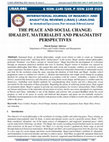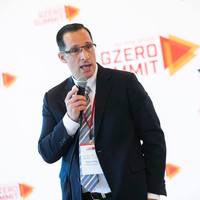Papers by Dinesh K U M A R Ahirwar
Sikkim Express, 2023
Self-Inflicted Violence is dominant discourse of present globalized society.
Sikkim Express, 2023
Modern Laws, Compassion and Empathy

Sikkim Express, 2023
Sustainable Progress I n a world where knowledge is power and progress is the ultimate goal, the ... more Sustainable Progress I n a world where knowledge is power and progress is the ultimate goal, the role of literacy cannot be overstated. It serves as the cornerstone upon which societies build their future. However, the state of literacy in any given society can either propel it towards success or plunge it into a myriad of challenges. The impact of illiteracy on communities and nations is undeniable, yet there is hope on the horizon, as global literacy rates, including those in India, have seen significant improvements in recent decades. Literacy, beyond the ability to read and write, is pivotal in equipping individuals with knowledge, skills, and competencies that are indispensable for personal development and the advancement of societies. It transcends individual benefits and extends its influence into social, economic, political, cultural, and environmental spheres. Evidence has shown that literacy programs not only enhance democratic values but also foster peaceful coexistence and community solidarity. Empowering people through a critical and emancipatory approach to literacy enables them to actively engage at both local and global levels, effectively addressing and resolving global challenges while ushering in more sustainable and peaceful societies. Since 1967, International Literacy Day (ILD), which falls on Sept 8, has been an annual reminder to the world of the intrinsic importance of literacy as a fundamental human right. It serves as a rallying point to propel the global literacy agenda toward more inclusive, sustainable, and peaceful societies. However, even with consistent global progress, the shadow of illiteracy still looms large, with at least 763 million young people and adults lacking basic literacy skills in 2020. Recent crises, including the COVID-19 pandemic, have further compounded these challenges, leaving us with a stark reminder of the urgency of the issue. This year's ILD carries the theme of 'promoting literacy for a world in transition: building the foundation for sustainable and peaceful societies.' It presents an opportunity for concerted efforts to accelerate progress towards achieving Sustainable Development Goal 4 (SDG4) on education and lifelong learning, all while contemplating the pivotal role of literacy in forging more inclusive, just, and sustainable societies. The day's celebration reverberates globally, resonating at the global, regional, national, and local levels across the world. The COVID-19 pandemic underscored the critical importance of digital skills and exposed the gaping digital divide that disadvantaged economically challenged individuals. Sustainable Development Goals (SDGs) can only be achieved in the presence of both basic and digital literacy. Financial literacy also deserves a prominent place in the literacy conversation. It is essential for individuals to understand the intricacies of managing their financial resources effectively. Extensive studies and reports have consistently demonstrated that literacy empowers individuals to make informed decisions. It is paramount that we prioritize education for girls, and the ongoing campaigns and programs related to girls' education are yielding positive results. Together, as a collective force, we can realize our vision of a fully literate nation. Whether through full-time commitment or volunteerism, there is a role for everyone to play in this mission.

IJRAR, 2023
Immanuel Kant, an idealist philosopher, sought social reform in order to create an "immanent tran... more Immanuel Kant, an idealist philosopher, sought social reform in order to create an "immanent transcendental moral order" and bring about "eternal peace" in the society. Hegel, another idealist philosopher, preferred "Freedom" over Kant's concept of "eternal peace." Hegel describes the development of civilization through an immanent dialectical idealism that rises to freedom. Hegel's notion of freedom was rejected by materialist philosopher Karl Marx, who argued that until social and economic conflicts are resolved, society cannot experience freedom or peace. Marx advocated a dialectical materialist framework to understand society and look for the resolution using the same, rejecting the idealism of both Kant and Hegel. Another school pragmatism wants to combine two schools i.e. idealism and materialism and sought social change by accepting idealism for setting the objectives and methods in accordance with the context. Ambedkar, a student of John Dewey, asserted that democracy and education can bring about social change and that peace is another name for democracy. Ambedkar used idealist methods for conceptualising ideal society and led a democratic social movement for the realisation of these principles. Regarding the means of achieving eternal peace, Kant argued for permanent ideals. Hegel is against to provide any moral guidance for society's advancement. Marx forbade any human interference in the materialist advancement of society, but his successors attempted it in experiments in Russia and China. Ambedkar is one of the thinkers and activists who accepted Buddhist ideals for social progress as well as for peace in society and believed that progress and peace are not mutually exclusive. Ambedkar used pragmatism to mix idealism with practice in the context of India to resolve the caste conflict and achieve the peace.










Uploads
Papers by Dinesh K U M A R Ahirwar